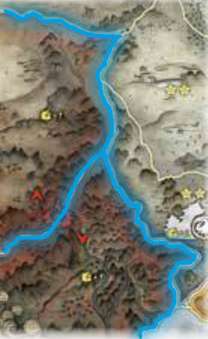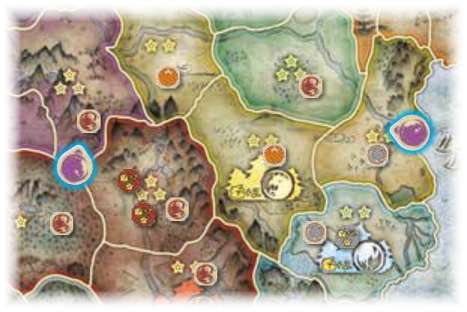
This section contains additional rules that players need to know to play the game.
Successful Defense
Each time a province is successfully defended, the defender places one of their faceup control tokens in that province, which provides that province with a defense bonus during their future battles.
If an attack against a province fails for any reason, that province is also treated as being successfully defended.
Finally, if a player places an army, navy, or shinobi token to defend a province and that province is not attacked, the province is treated as being successfully defended.
Defense Bonuses
There are a variety of defense bonuses that a defender can use to increase their strength during a battle, as follows:
-
Some provinces, such as provinces with a clan capital, have an inherent defense bonus. These bonuses are represented on the map by an icon and strength. (A province containing a clan capital has a defense bonus even if that clan is not represented by a player in the game).

Defense Bonus
Printed on Province
-
Each faceup control token in a province provides the defender with a defense strength of 1. Each time a player successfully defends a province, they place a faceup control token in the province they defended.
-
There is no limit to the number of control tokens a player can have in a province if they continually defend that province successfully.
-
Some special tokens added to the board by territory cards provide defense bonuses. Players place these tokens on the board by playing territory cards.
Special Tokens
Special tokens remain on the board for the duration of the game. These include scorched earth tokens, peace tokens, and a variety of tokens that are placed by territory card effects. A province can only contain one special token at any time.
Peace and scorched earth tokens cannot be replaced by other special tokens, but other special tokens can be replaced by peace and scorched earth tokens.
Example: Dragon controls a province that contains the harbor token. During the placement phase, Dragon places her diplomacy token in that province.
During the resolution phase, the diplomacy token causes a peace token to be placed in the province, which replaces the harbor token.
Scorched Earth

If a province contains a scorched earth token, that province cannot be controlled or attacked for the remainder of the game. Players cannot place combat tokens in a province that contains a scorched earth token or on a border of that province.
A player can still control a territory if one or more provinces in that territory contain a scorched earth token. To control the territory, the player only needs to control the provinces without scorched earth tokens.
Peace

If a province contains a peace token, that province cannot be attacked and the player who controls it cannot attack adjacent provinces from the peaceful province.
Players cannot place combat tokens in a province or on a border of a province that contains a peace token.
Shrine

If a province contains a shrine token, that province cannot be attacked; however, the player who controls it can attack provinces that are adjacent to it.
Players who do not control the province containing a shrine token cannot place combat tokens in it or on its borders.
Battlefield

The battlefield token ensures that honorable battle will always occur in its province. If a province contains a battlefield token, players cannot place diplomacy tokens or raid tokens in that province.
Harbor

The harbor token must be placed in a landlocked province. While a province contains a harbor token, it is a coastal province.
The player who controls that province can defend it with navy tokens, and other players can attack it by placing navy tokens on its borders, even without controlling adjacent provinces.
Honor Bonus and Defense Bonus

Honor and defense bonus tokens are added to the board by territory cards. Honor bonus tokens provide additional honor as indicated by the token.
Defense bonus tokens provide additional defense strength as indicated by the token. Each defense bonus token also provides one additional honor.
Playing Territory Cards
Each territory has a space on the game board for a territory card. At the end of each resolution phase, each player determines if they control any territories. If a player controls all of the provinces in one territory, they take the card from that territory's space.
At the end of the resolution phase, if a player loses control of a territory and they have not played its territory card, the card is returned to its matching space on the board.
Territory cards provide players with single-use abilities. Players can play territory cards during the upkeep phase. The two Shadowlands territory cards are the exception to this rule; see "The Shadowlands" below.
To play a territory card, a player reads and resolves the text on the card. Then, they return it to the game box; that card cannot be played again during the game. After a territory's card is played, it is not replaced. Any players who gain control of that territory later in the game do not gain a card for doing so.
Removing Tokens
When a combat token is removed, it is discarded and placed in its owner's discard pile.
When a control token is removed, it is returned to its owner's pool of control tokens. If a card effect instructs a player to remove one of their control tokens, they choose the province from which they remove the token. If the chosen province contains more than one control token, faceup control tokens are removed before facedown control tokens.
When a special token is removed, it is returned to the pile.
The Shadowlands
To the south of Rokugan lie the blighted Shadowlands, a dark realm under the sway of Fu Leng and the corrupted armies from the realm of Jigoku.
The only safeguard between the Shadowlands and Rokugan is the mighty Kaiu Wall and its builders and defenders, the Crab Clan.
Should the Wall ever fall, a combined force of goblins, ogres, undead, and legendary demons known as oni would spill forth from the Shadowlands with the sole intention of destroying civilization.
The southwest provinces of the map are the Shadowlands. Each of these two provinces is a single-province territory with a defense bonus.
There are two territory cards for the Shadowlands, one for the north province and one for the south province. (North and south are indicated by the arrows next to the Shadowlands icon).
If a player controls a province in the Shadowlands, they take the appropriate territory card as normal. Shadowlands territory cards are not played during the upkeep phase; they are played at the start of a player's turn during the placement phase. These cards grant dark, powerful abilities to the daimyō who use them, but they require sacrifice.
The Shadowlands do not provide players with honor at the end of the game. A player does not gain honor for controlling Shadowlands territories or for having faceup control tokens in either Shadowlands province.

The Shadowlands contains two single-province territories, both highlighted here in blue.
Scout and Shugenja Cards
Scout cards are single-use cards that allow daimyo to send their scouts into the battle to gather information about the opposing forces.
During the placement phase, a player can play one or both of their scout cards at the start of their turn, before placing a combat token. Then, they return the card to the game box; that card cannot be played again during the game.
Shugenja cards are single-use cards that allow daimyo to harness their shugenjas' magic to eliminate the opposing forces. During the placement phase, a player can play their shugenja card at the start of their turn, before placing a combat token.
Then, they return the card to the game box; that card cannot be played again during the game.
Ronin
If a player has no control tokens on the board at the start of the upkeep phase, they become ronin. During that round's placement phase, the ronin player can place army tokens on any land border, and they cannot place raid or diplomacy tokens.
If a ronin player cannot place any tokens during their turn, that turn is skipped and the ronin player cannot take any more turns during that placement phase.
At the start of the next upkeep phase, if the ronin player has at least one control token on the board, they are no longer ronin and all normal rules apply to them.
 Unicorn is ronin. During this placement phase, Unicorn can place his tokens ignoring adjacency rules. |
Continue Reading
